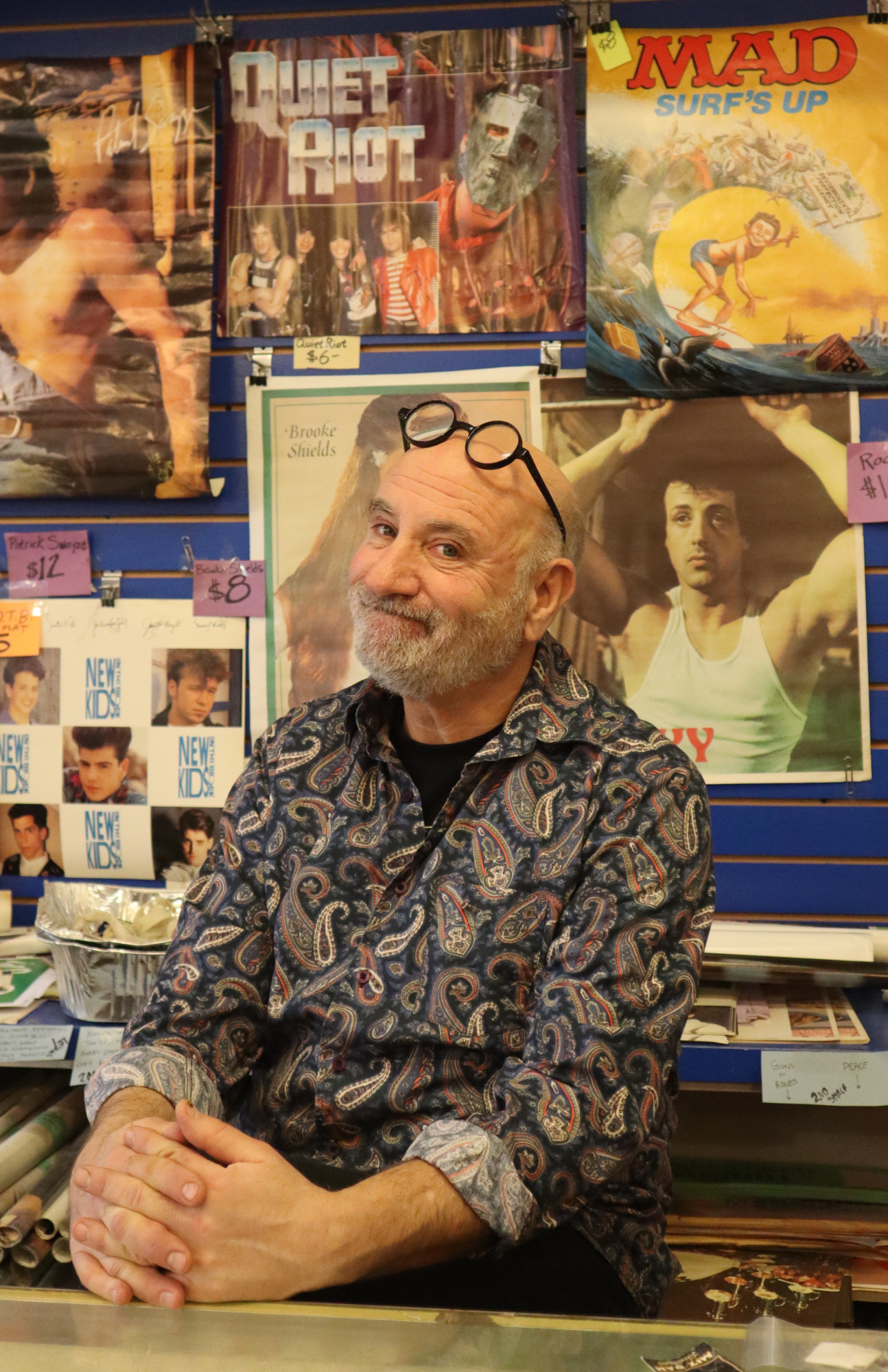LOCALS ONLY: LIFE LESSONS W/ STEVE PRESSER
Store owner Steve Presser reopened Big Fun as a pop-up store in Coventry last fall, reviving the eclectic pop culture portal of vintage toys, 20th-century reads, and apparel. Big Fun has a uniquely funky atmosphere and has been a must-see tourist attraction for three generations. The store embellishes the characteristics of its counterculture neighborhood with graffiti-decorated walls and ceilings and an antique Spider-Man replica that greets customers at the door. After closing the store in 2018, Presser’s comeback was whimsier than ever.
The store’s homecoming was made up of pieces from Presser’s own collection, sourced and inspired largely by his visits to antique stores across the country that house the collections of predominantly toys, knick-knacks, and gag gifts. On the snowiest day of the year, Presser brought me into his charming and wacky world to get a closer look at the life of a dreamer. Presser seemed to be just as enamored by his columns of treasures that have brought smiles to patrons he’s met over his storied career as he is the blue-chip masterpiece that stands alongside them.
CJ: How does it feel to be you right now?
SP: Wonderful. You have to understand that I have a wonderful family. Lovely wife. I have a store that was my legacy that closed 4 1/2 years ago, and I’ve had the opportunity to do a curtain call. A swan song. A bow. And it's beyond incredible. Beyond my wildest dreams.
CJ: How does it feel to have the store back open?
SP: This was such an important part of my life, and I had to walk away. It just wasn’t working anymore. Everyone thought I was making a lot of money, and I jokingly said I was running a non-profit for the last four years. And I did.
CJ: Why did you come back?
SP: I’ve lived in the Coventry neighborhood for 41 years now. Five years in an apartment, 36 years in our house. And Coventry was starting to get sad for me. I was seeing empty storefronts; they never had empty storefronts. So, I contacted the building management and said I’d like to come back as a pop-up shop. It’s been two months and the ability to go back to your home and just dust off the cobwebs, reopen, and see all of your old customers. This is opportunity opposed to devastation.
“DON’T BE A WHAT IF. ”
CJ: Is there anything that you’d like to change in your reality? What is it, and how would you change it?
SP: That’s a tough question for me. I’ve had so many different opportunities in my life, and many different people take advantage of me. So sad to say, but it’s truthful-I’ve lost more money than I’ve made. Being in business with people stealing from me. How would I alter it? I am a very trusting, giving person. I wish I was better at not allowing others to take advantage of me. I’ve had a blessed life. I tell you, there is no one richer than the person sitting across from you right now. You’re going to find very few people with a body of people around them that are supporting, loving, and care about them. If that’s a collateral loan in life, then I shouldn’t have a problem.
CJ: What ignites your day?
SP: Now that the store is open, I’ve been reignited, so to speak. My daily regimen for 30 years was to come down and make people happy. My days are always filled trying to help others. It’s just the way I’m hardwired—the way I was brought up. If I can give to somebody or help somebody, that makes me happy. That’s what I thrive on. I’m just a strange beast. This is strange stuff; I don’t know if you want to put this in there.
CJ: No, tell me.
SP: Philosophically, we are all put on earth for a purpose. When I walk out in the morning, I am hoping to have a positive impact on someone’s life. There is so much negativity out there that I, at my late age, think that it’s best to separate myself from people that are negative. There comes a point in life when negativity becomes poison. I’m a pretty good reader, but I can tell ya that I’ve been screwed more times than a porn star. It’s funny because I am a good judge of character, but I’ve been mistaken many times.
CJ: Right now, our culture seems to have forgotten about forgiveness. We’re in this space with people learning in real time [on social media] and expressing how they feel about things. It’s very easy to say something and not know right away that it’s offensive. But if you can come back around…
SP: But you were brought up in Shaker Heights, and I grew up in Cleveland Heights. We’re aware. I told my kids when they went off to college, “You will realize how great it was to grow up in the Heights.”
CJ: My parents gave me a similar speech.
SP: Exactly. And they will also find out how many of the kids really dislike their parents.
CJ: Yeah.
SP: As you grow up, you realize, what we have here in Cleveland Heights and Shaker Heights is a life lesson; it’s not just an education. Most schools have great educational systems, but it's the life lessons that you learn, and that’s the key. For my kids, diversity has always been important. Racial, sexual orientation, art, music, and humanities.
CJ: It’s just a way of thinking.
SP: I remember going to college [the University of Michigan], and I remember this guy from the Upper Peninsula who had never seen a Black person, never saw a Jew before, and never smoked pot. By the end of the first semester, he just burned out. He did everything. He engaged in a lot of drugs, and he didn’t make it through his first semester.
CJ: You were on your way to get your master’s at Berkley, correct?
SP: What happened there is I graduated with honors from the University of Michigan pre-med program and was gonna go to medical school. My friends, who are a year older, said,'Steve, we think we know ya. We do not know if med school is for you right now.’It was at a time when they were really grinding people and I took a step back. I decided to move out west. Go to Berkley, get a master’s in psychology, maybe get a doctorate. So I moved to San Diego to get residency and a high school friend of mine’s family moved out there and I lived with them for about 6 months. San Diego is beautiful but you walk out and everybody is like, “ wow, what a beautiful day.” I ended up going to the beach. I couldn’t find good work, there were no good museums, the jazz club was the size of half this room and it really wasn’t jazz it was just records. So I moved back and that’s when I worked with the developmentally disabled.
CJ: How was that?
SP: I loved the job. I did it for two years. It was a phenomenal time. My wife and I started dating within days of starting that job. It was almost simultaneous.
CJ: It seems like you had a good community. Did it help with making that pivot?
SP: I did have a good community. It’s interesting because there will be people that I would see at a high school reunion that would say, ‘ Steve, we expected more out of you. We thought you’d be a doctor,’ then there are people who will say, ‘Wow, Steve, you have lived such a rich life because of what you’ve done.’ That’s how people perceive it. Could I have gone down different paths? Sure. But the people I’ve met because of the path I’ve chosen I’ll never trade it. I don’t say that lightly. I am around amazing human beings.
SP: You know who Harvey Pekar is?
CJ:Wait. Harvey, Harvey?
SP: He was on David Letterman. American Splendor.
CJ: Yes, American Splendor!
SP: Harvey and I were good friends.
CJ: Wow, I was gonna ask. I was walking in Lakeview Cemetery and I saw his headstone.
SP: You saw the pens!
CJ: I saw the pens. I left a pen and a quarter, said thanks, Harvey, and I watched the film. I was really impressed with how they captured Cleveland Heights.
SP: Harvey became a friend because my store was across the street and my daughter was friends with his daughter, Danielle. Harvey was a character. A lot of unfiltered stuff came out of his mouth and that’s why I think he did so well on David Letterman. But he crossed a line ‘cause he was very political. He was a very bright guy. Yes, he knew they were poking at him, but he also played into it. When he would interview me for his graphic novels, we would go to Tommy's, and he would draw these stick figures while he was writing. I always wanted to have one of those. It was Harvey’s stick figures.
CJ: Thinking about Big Fun, much of the store is filled with artifacts that have now been digitized (like the app store) or are completely absent.
SP: Well, I’m not happy about it. It sucks the soul out of the whole shopping experience. I mean, yes, they are creating these websites and shopping markets where you can click through and pick out the thing virtually. It's very visual. I knew a woman whose mother had gone blind, and she would come into the store, and I’d let her pick up and touch things. And she would feel through and touch the things from her childhood. Could she do that online? You got Suzanne [Degaetano] from Mac’s Backs-Books. She’s one of the hearts and souls of Coventry. Could she go online and sell all those books? Sure. But she has a speaker series, writers that come in, and a wonderful staff. That whole idea of shopping online is disheartening because it’s taking whole neighborhoods and mothballing a lot of good stores.
CJ: What would you like to see happen for Coventry?
SP: Well, I’m hoping Big Fun’s pop-up was a part of the movement to bring more brick-and-mortar, mom-and-pop’s in the area. I got a lot of traffic. Lots of people came in, they shopped at other stores, they ate, they came here [Phoenix Coventry], and I’m sure to Tommy’s. It helped other businesses. But the pendulum swung, Lexi, so far to the online shopping before Covid that when Covid hit, it was a double whammy. People were obviously staying home. It’s hard to retrain a human being to come back and go shopping in the store after they sat up on their laptop or their phone and the next day or even that day to get their package.
CJ: Any advice for people starting up their own business?
SP: Follow your passion. My father used to say this: Don’t be a what-if. That’s why I moved to California. Just do it; follow your dreams. Hire knowledge. I love learning. I love enlightenment. I love being around visionary people. That’s the key.

